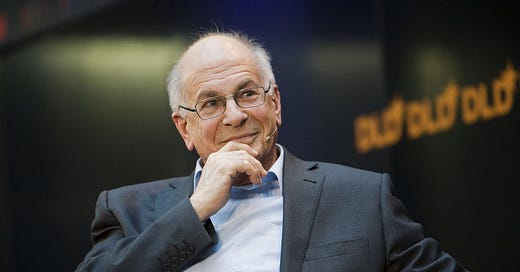Toronto, May 11, 2025
A complete life
Is there such a thing as a complete life? Daniel Kahneman thought so.
A cognitive psychologist and behavioral economist, Kahneman studied human judgment and decision-making. In 2002 he won the Nobel Prize in Economic Sciences for this work. In 2011 he published a famous book, Thinking, Fast and Slow. In the book, Kahneman describes two modes of thought: System One is fast, instinctive and emotional: System Two is slower, more deliberative and more logical.
In March 2024, Kahneman flew to Paris with his partner. Spring had arrived and the cherry and magnolias trees were in bloom. They spent a couple of days walking around the city, visiting museums and dining in chic restaurants. Then they travelled to Switzerland. There, on March 27, Daniel Kahneman, age 90, died by assisted suicide.
Kahneman’s decision to die was, I think it fair to say, a System Two decision, made slowly and with deliberation, and was, in his eyes at least, logical.
A few days after he died, Kahneman’s friends received a letter of explanation. “I have believed since I was a teenager,” he wrote, “that the miseries and indignities of the last years of life are superfluous, and I am acting on that belief. I am still active, enjoying many things in life (except the daily news) and will die a happy man. But my kidneys are on their last legs, the frequency of mental lapses is increasing, and I am 90 years old. It is time to go.”
Shortly before he died, Kahneman was interviewed by philosophy professors Katarzyna de Lazari-Radek and Peter Singer. He said, “I feel I’ve lived my life well... I’m just reasonably happy with what I’ve done. I would say if there is an objective point of view, then I’m totally irrelevant to it. If you look at the universe and the complexity of the universe, what I do with my day cannot be relevant.” Before the interview Kahneman told De Lazari-Radek and Singer that he was on the point of going to Switzerland to commit suicide.
More than a year later, De Lazari-Radek and Singer, in a New York Times article, commented on what had happened: “Professor Kahneman thought that he had completed his life...” The two ethicists cautiously supported what Kahneman had done: “[I]f, after careful reflection, you decide that your life is complete and remain firmly of that view for some time, you are the best judge of what is good for you. This is especially clear in the case of people who are at an age at which they cannot hope for improvement in their quality of life.”
Wanting to die because you have a terminal illness or grievous and irremediable medical condition is one thing. Wanting to die because you believe your life is complete is quite another. The arguments in favour of the former do not apply to the latter. In my experience, many seriously old people find the “complete life” idea attractive because it easily accommodates their desire to avoid the physical horrors and indignities of extreme old age. But there is one tricky problem. How do you know when the moment has come? Daniel Kahneman thought he knew.
On the day Kahneman died, Daniel Engber, a science journalist who knew him well, wrote in The Atlantic, “Daniel Kahneman was the world’s greatest scholar of how people get things wrong. And he was a great observer of his own mistakes. He declared his wrongness many times, on matters large and small, in public and in private.”
Was Daniel Kahneman wrong when he went to Switzerland to die?
*****
Reader comments on Endgame #104 (“Failure”)
From Earl Cherniak: I have read many books on Antarctic exploration and know the Oates story well. Your piece resonates with me in a small way. I learned much more from my losses than I ever did from my wins. Having many losses, I gained much wisdom!”
From Marian Botsford Fraser: “You transported me back to London, to a big old flat in Earl’s Court. I would have been about 23. I was sharing with three English “chums” and my best friend from birth; I had the smallest room, basically a closet. The flat had a huge bathroom with one of those enormous, long narrow bathtubs, no shower, of course. For reasons that elude me, and also how, I am lying in that bathtub, I’m sure it was on a Saturday afternoon, reading Apsley Cherry-Gerrard’s The Worst Journey in the World. A very large book. I could not stop reading, and I remember as clearly as anything the bath water getting colder and colder as I read.” (Apsley Cherry-Gerrard was a member of the Terra Nova expedition.)
From Grace Westcott: “What an extraordinary passage from Chat GPT! Genuine thought and a bit of poetry. Wonder where it swiped it from?”
From Philippe Poussier: “You seem to consult Chat GPT quite often. It puzzles me and, in this current instance, its response... reinforces my total lack of interest for it in this kind of circumstance, and actually repulsion for this kind of application of AI. Applications of AI to médecine, science, and other noble causes, yes but substituting it to human thinking, there is its major danger.”
From Bob Rae: “When I asked a tech businessman how he decided who to hire he said ‘I ask people how they’ve failed at something and how they got over it.’ ...Embrace failure. Fight perfectionism.”
And finally, something I forgot to mention in last week’s essay: “Ever tried. Ever failed. No matter. Try again. Fail again. Fail better.” These words appear in Samuel Beckett's 1983 story “Worstward Ho” and are tattooed on the arm of my favourite tennis player, Stan Wawrinka.





We can't say he rushed into death. At ninety, with failing kidneys, he opted to exit with his faculties intact. Seems a highly reasonable choice.
It should be our choice.
Having to pay an enormous sum? No.